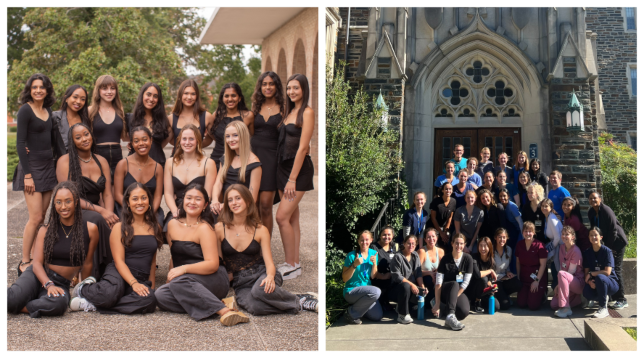First Year Student Blog: Eryka Molino

One of the main reasons I chose the Duke PA Program is its holistic approach to medicine. The curriculum focuses on the social determinants of health as well as the clinical reasoning required to practice medicine. Both are important to me, as I have been on both ends of what it is like to not be “the perfect patient.”
In November of 2022, I received a bipolar disorder diagnosis that I knew was coming but did not have the courage to face yet.
Six months prior, I graduated summa cum laude at Arizona State University with a 4.0 GPA. I had publications in the works and juggled two jobs and two research labs. To the outside world, it looked like I had everything: I was decorated with accolades, loved by my family/friends/partner, and overall, seemingly happy.
But in a single month, all of it went away. I broke off a five-year relationship. I stopped my research in accordance with my graduation. My world truly fell apart. I spent the next few months in a series of manic and depressive episodes. Sometimes, I would spend 16 hours a day taking up a single task, and sometimes I slept for 20 hours. With no structure or reason to get out of bed, I felt my mental health decaying. Through my psychology courses, I rudimentarily learned about some diagnoses people could have, but I never thought it would be me. It took me so long to come to terms with needing therapy and “outside” help. Eventually, I realized it was not because I didn’t want help but because my parents wouldn’t believe I needed help.
I grew up as a first-generation student in a traditional Filipino family, where the culture excluded mental health issues.
My parents did not take my diagnosis well. It took many more months of struggle with myself, my parents, and insurance companies to get my medication.
In a healthier state, I realized then that medicine is not just a prescription or an appointment slot. A patient with a chief complaint is a person outside of the clinic walls and not just a set of signs and symptoms. I experienced firsthand that social, financial, and cultural structures specific to a person’s daily life were a much larger influence on medicine than anything else. In conjunction, I remembered my time working in the emergency department and seeing how patients who were labeled as medically non-compliant were often dismissed before they had a chance to explain why they were not able to fill a prescription. After my own diagnosis, I found a calling to see past the signs and symptoms of a clinical case and re-imagine medicine as person-centered instead of patient-centered.
My first few months here at Duke have been everything I have dreamed of and more (especially in terms of workload).
The amount of content is intense, but the motivated students and caring faculty have made it more enjoyable. The content is becoming more clinically orientated, which is exciting as we are learning the entire patient encounter from the first initial visit to the discharge with patient education.
Outside of learning, I was nominated as a community outreach co-chair, where I help link the PA student class with organizations dedicated to giving back to the community. So far, our class has raised about $1700 and has a one-year goal of $12,000. Throughout the last two months, classmates have volunteered to show support for breast cancer patients, veterans, and a member of the very first graduating PA class (ever). On the main campus, I joined one of Duke’s acapella groups called Deja Blue: this group reminds me that there is life outside of school and keeps the gas tank full during the long days and short weeks in the PA program.

In the short amount of time I have been a student here, I am finding more and more passion to become the provider I would have been comfortable going to in my own time of need. One that advocates for the marginalized, one that is inclusive to all cultures, and one that understands the value of life outside of textbook medicine.
Eryka Molino is a second-year student with the Duke Physician Assistant Program. Email eryka.molino@duke.edu with questions.
Editor’s note: Duke Physician Assistant Program students blog monthly. Blogs represent the opinion of the author, not the Duke Physician Assistant Program, the Department of Family Medicine and Community Health, or Duke University.